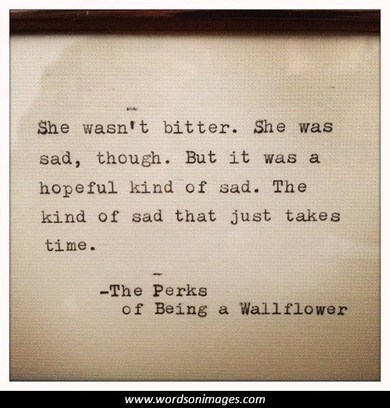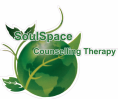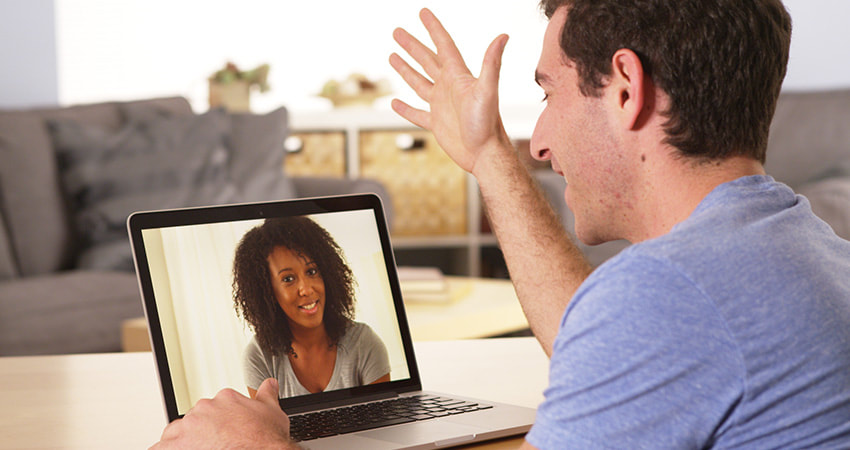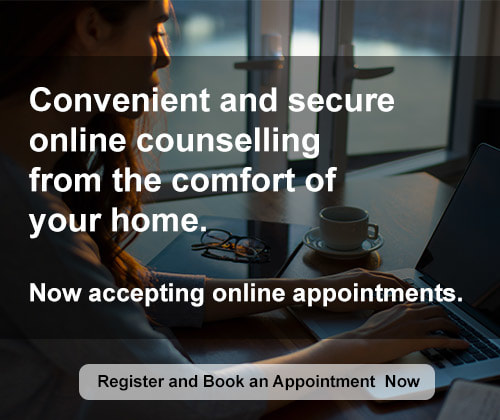|
Although, as a nation, we are experiencing a rise in mental health concerns (one third of Canadians are at high risk for mental health concerns), we are also living during a time of tremendous technological advances. Some of these have certainly impacted us unfavourably, such as in our loss of ability to have conversations with full sentences :) and perhaps has increased our impatience levels. However, there are many advantages as well. During a time of long wait times for psychological services, we can offer the option of video counselling with an often much shorter wait time. Many still hold onto an apprehension around online counselling and prefer face-to-face. In many ways, there is little that can beat the face-to-face interaction. But, let's look at some reasons why video could be a very viable option by walking through a possible scenario... Picture yourself at home when you start feeling that old familiar feeling of panic and anxiousness. Typically, these feelings increase in you later into the night. You know from experience, sleep is far off as your mind flips in a thousand different directions. You begin to scroll the internet in desperate need for some help. You discover a counselling centre where you can book online. Click, click...there, you've done something...you feel like you've accomplished a major first step...ahh...breathing a little easier. The next day arrives and you realize what you've done. How will you ever be able to get out of the house to go to a counselling appointment? You must have been in a terrible state last night to think you could do this. You don't want anyone to see you walking through the doors of a counselling office. You know how it is...you don't judge anyone else who goes there, but it's different when it is you going in. You go back online to look into cancelling your appointment when you see the option of doing your session from home. Well, this feels a little more possible... The idea of being home, maybe even in your pajamas, immediately brings you some comfort. You decide to keep your appointment, but opt for the video chat. Once again, you are breathing a little easier and proud of yourself for taking a big step. The time comes for your appointment...you feel a bit nervous, but feeling more at ease knowing you can stay at home. You are not overly technical either, so you wonder if you can handle the procedure for doing video. As it turns out, you receive an email to login for your appointment. You discover the process to be quite simple and suddenly you are face-to-face with your counsellor. The appointment goes fairly smoothly. Your counsellor handles any technical details and is even able to show you some other helpful tools online by splitting the screen. Although, before the session, if felt as though there was too much to try to tell another person, before you know it the session is over and you are feeling much lighter. During the session, you realize being at home feels really good...you like wearing what you want, sipping a cup of tea, and relaxing on the couch. This is much better than combating all those thoughts in your head - this time it feels like you are actually doing something with the thoughts. For the first time in weeks, you sleep easy. Of course, this is all speculative, but it is also all very possible. Although video counselling sounds technical and unfamiliar for some, it is actually almost the opposite. The technical part is already taken care of by those who created the platform for us to use. And, really, we are talking face-to-face...with one step removed...the time it takes to beat traffic, use gas, find parking, and walk through the door of a physical space. Online therapy still may not be the most ideal substitute for face-to-face for many, but it does have many advantages. It is also a great first step for starting therapy and in most instances shortening that wait time for your first session.
2 Comments
 From the time I can remember, I have had moments of feeling sad. Today, we tend to label this as depression and attribute one to have a mental health condition. (Please note, for the sake of this post, I am primarily referring to the mental health conditions of depression and anxiety.) We also go so far as to promote the acceptance of mental illness in our society. I am not okay with this. Let me explain. By providing acceptance for those with mental illnesses, we are instantly segregating people and this is something that has never settled well with me. I see everyone as human beings and as humans we are born with a variety of emotions. It has been through not providing an acceptance for other emotions in our society in a normalized way that has caused an emotional influx in people. Nobody knows what to do with those other perfectly normal emotions within them because there has been nowhere to put them. Our solution is to create another segment of people labeled with mental illness and simply put them over there. People can then feel good about themselves because they are accepting of this and/or can now explain their emotional state. Back to what I was saying earlier…I have many memories of feeling sad at various times in my life. I also have memories of happiness, anger, frustration, elatedness, and so on. Something I have been understanding more as I get older is this idea that sometimes I just simply need to be sad. Sometimes there might be a very distinct reason and at other times the reason could be from a build up of several life events without my even realizing. The time I take to be sad can be comforting and ultimately re-energizing. As I give myself time to process what I am feeling, I am also renewing my energy. The important thing is that I give myself permission to do this and to not feel guilty for doing it. In general, we have been taught to push any type of feeling (other than happiness) aside and push through…so to speak. We are considered tougher and stronger when we do not feel what we often need to feel. As a result, we will fight, resist or avoid the feeling (which only continues to persist) and end up with mental illnesses such as anxiety or depression. Now, think about how this situation could be different – if you were to accept the feelings you have and be vulnerable to them. Vulnerability has gained a bad rap over the years (before Brene Brown showed people the light) and has typically be seen as being weak. In reality, it is through feeling vulnerable that we actually gain strength. This takes much more courage than avoiding the feeling does and will aid us in believing in ourselves – the ultimate strength. Everybody will need to process their feelings in different ways. Many times it is dependent on what is going on in your life and what types of supports you have. If your main support people process differently than you, this could develop into a slight conflict or perhaps cause you to feel that you are doing something wrong. I cannot stress the importance of listening to your gut more than in instances such as these. We have a strong tendency to compare ourselves to others versus listening to what is going on inside of us. When someone else feels or says something, we want to believe this as the truth. Well, there is no other truth than what you are feeling. I know we are taught a great deal of rights and wrongs in our lives, and many of them the majority can likely agree upon. However, when it comes to your right and wrong, only you can decide this. Unfortunately, the last person we will turn to for answers at times is ourselves. The information we gather from the people in our life as well as our life experiences is what we have to drawn on to form our own answers. So, this is what I suggest…. Next time you are feeling anxious or sad, take a minute to trace the feeling backwards a little to determine where it may stem from. You have my permission to not feel guilty about simply feeling. Then just take some time to process those feelings. Most important, let’s try to work together as human beings in this world as a collective. The reality is we are born with emotions – why segregate that? I haven't posted in awhile. I guess in a lot of ways I have been struggling with my own self-worth. Sometimes I think I have it all together when suddenly, out of nowhere, I seem to be back to square one again. Basically, I have not felt that anything I attempt to write about will be worthwhile to another...is this a low self-worth?
Well, it did get me thinking. We tend to confuse the terms self-worth and self-esteem. Essentially, self-esteem comes from a place where we tend to compare ourselves to those around us and how we measure up in society. For example, have you ever received a mark on something such as a test or exam and did not feel very good about it until you hear about another person making a lower mark than you? Instantly, we feel better about ourselves when we think someone else has performed worse than us or when we think someone else's life does not seem to be going that well. Within this constant comparison mode, we are developing our self-esteem whether it is high or low, but all based on another person or event. This comparison by which we are measuring our self-esteem is affecting our self-worth. So, rather than trusting ourselves, we put the values of somebody else or what society believes to be accurate ahead of what we may or may not believe to be true. If you can get your head around that, then think about how trusting another's opinion over your own can ultimately chip away at your self-worth. This can also lead to measuring how much we have, materially, and how that contributes to how we feel about ourselves. Self-worth is intrinsic - if you still like yourself after you take all that you have away, then you are ahead of the pack. We base it on who is in our life - our family, friends - the job we have, how much money we have, the house we live in, the clothes we wear, etc. Do not get me wrong, all of these things can be great, but they should not measure who you are. Only you know who you are if you care to look inward. All the above and society's measure of self-esteem simply create a need for us to look outward and compare. Our self-worth is based on those intrinsic values that you want for yourself and who you are, not so much what you have. So, I had a pretty good think about all of that and decided I did not want the tendency to compare myself to society to override what it is I want to say. I am hoping my belief in myself will continue and I will continue to post based on what I am learning from it. Let me know if you are experiencing any of the same. Are you familiar with the comment, "If that fails, I will try..."? What does that even mean?? As we live our lives and make choices, we can be made to feel like a failure when something does not turn out according to plan...our plan. I know, I am being confusing so far, but while listening to a radio show recently, I continued to hear kids talk about what they want to be when they grow up and would refer to the above phrase frequently. So, sounds like they are ready with a back-up plan, but why the emphasis on the word fail in regards to their own life?
Okay, I am not exactly sure I understand all of our ideals as a society...I mean, sure, it can be helpful to have a plan for our lives, but really, there is no recipe for anything when it comes to how we live our life. The best we have is experience. So, if we are actually making some choices and we one day learn one of those choices is not going to work for us any longer, then it would seem we may have just learned one more thing about ourselves. Personally, I much prefer the sound of learning to failure. This may also allow us to move onto another choice in our life and recognize in hindsight that it likely would not feel quite the same had we not have had that previous experience...see where I am going here? I just figure all of our choices are guiding us to a life of greater fulfillment. That same radio program refers to the need to find one's passion in life and to stick with it! I have heard this a lot over my years and I have to admit, all it has ever done for me is to add a great deal of pressure in the life choices department. As a young adult, I remember thinking, what is my life's passion? How come so many people know the answer to this I don't? I realize now, I was not alone. If I was listening to the words we tend to use, I would say I had to move through a great number of failures before finding it. But then again, as I moved through my experiences, I recall feeling bits of passion for any number of things throughout those times. By simply making the end result our main focus, we can become very down during the process and ultimately miss out on some pretty great moments. The words we choose to use can have a fairly significant impact on how we feel about our lives. Furthermore, if we buy into a phrase or word as a whole society, this can be even more damaging to our self-esteem if those words are not overly helpful. If we are led to believe that we are in constant search for something we do not think we have found yet, we may never get to enjoy any of the moments in-between. Take a moment to blend all of your moments together in your life and notice how one can build on another; suddenly it can feel like, hey, I am living my life! The important part here is to remove that natural tendency to compare yourself to some societal ideal and to take time to look at the inner you. All of the choices that have led you to where you are now are certainly not failures, but rather contributions to your life and possibly deeper fulfillment. Unfortunately, it tends to take lots of lived experience before we figure this out :) Enjoy your moments! Do you know what I mean by feeling stuck? I am sure we have all been there at some point in our lives, perhaps some more than others. So, what happens when that stuck feeling starts to dominate your life? When you cannot even remember not being stuck? And, what is it that keeps us feeling this way and prevents us from moving out of it? Or, do we really need to move out of anything?
I am starting to think this notion of being stuck is derived from a variety of sources. First, it comes from ourselves when we are feeling as though we are not performing up to par in our lives, but do not know what to do about it. On another level, we are comparing where we think we should be in life to society's standards...which leads to..ug, more pressure. There is also the ongoing chatter in our heads that has the ability to make us feel more scattered than needed, and adds, yet again, to feeling stuck. In other words, if there is too much clutter, how do we know which way to go...resulting in the ultimate crossroads of stuck! So, how about we make this stuck feeling a societal issue instead of personal one? (feel better?). We tend to listen to all the advice around us whether it is - friendly advice, the latest trends, self-help gurus, doctors, and so on. Adding to this is the increase in avenues of how to relay the information to people (i.e. any form of social media) - and, we have all the latest information at our fingertips anytime. In the end, it makes for an awful lot of advice on how to live our lives. Would not any average person feel a little more than overwhelmed (leading to stuck) if we paid attention to it all and then compared to see how we measure up? It would seem the one person we fail to listen to is ourselves. I cannot help but wonder if we turned inward and took notice as to what we are actually feeling and thinking, if we could have some of the answers we are seeking.sting ourselves is a difficult concept, but one that could prove more helpful than what google is telling us. I know from my own experience, feeling stuck can be frustrating in the moment, but if I turn off my temptation to look outwards and really listen to me, my stuck feeling becomes a blessing. Perhaps one needs to feel stuck now and then in order to ultimately move in the direction we want. I hope this blog does not feel like more advice and confuse you more. If you are feeling stuck, just know you are potentially in a really good place! As we enter into another new year, the all too familiar feeling of making promising resolutions re-surfaces. Do you feel the pressure? I have always found it difficult to jump on board with this tradition - for one thing, a year goes by way too quickly now for me to even think about what new thing I can change about myself once again. I mean, what is so bad about the current me? And, if there was something I wanted to change, why is it that I have to wait for some magical date to initiate the process?
The older I get, the greater desire I have had to live and to be in the present. I started paying more attention to it once years ago when I was forced to slow it down. I was out of work and in constant pursuit of my next move, filled with worry that I had no future. I would notice how most of society dictates us to live and to plan for the future and, in return, we obey and consistently live our lives for tomorrow. I am not saying planning is a bad thing, a certain amount of responsibility in one's life can only benefit our today; however, we tend to become so caught up in the planning and worry for our tomorrow, we completely forget about our now. For me, learning to live in the present has been a journey worth taking. My greatest teachers have been nature, time, and my dog. Nature just happens, we cannot control it, but we tend to find the beauty in it. Time is the fairest of all things as we all have the same amount - it can mean different things to different situations, but a 24 hour day is still a 24 hour day. And my dog, well, she only cares about now and goes after what she wants when she wants it...she keeps things fairly simple with eating, drinking water, playing, and loving everyone she meets. I am pretty sure she is not waiting for a new year or tomorrow to make any of them happen. |
AuthorRuth Archives
June 2018
Categories |


 RSS Feed
RSS Feed
